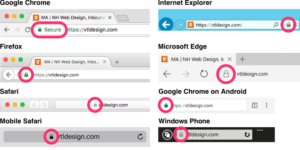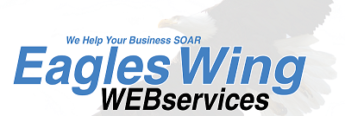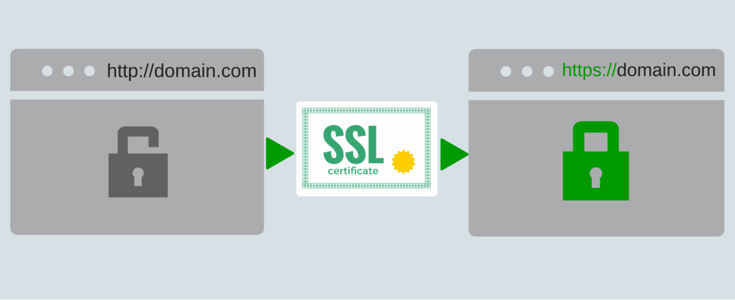Coming to a website near you! Secure Safety SSL (Secure Sockets Layer) is the standard security technology used to establish an encrypted link between a web server and a browser. This link ensures that all data passed between the web server and web browsers remains private.
Most websites which take credit card payments or ask users to input personal private information in an online form or have login pages will have an SSL installed on their website. A good way to tell is if the url begins with HTTPS vs. HTTP. You will also see a closed padlock icon vs. an open padlock icon.
Here’s an image of what a secure site will look like in the browser bar:

Due to the growing number of criminal hackers trying to gain private information on the internet, Google Chrome (among others) flags websites without a SSL certificate as UNSECURE. This is necessary as we rely more and more on the Internet for business and personal transactions.
Also, when browsing with Incognito/InPrivate mode, the assumption is increased expectations of privacy. However, HTTP browsing is not private to others on the network, so some browsers will also warn users when visiting an HTTP page in these “private” modes.
How it works.
An SSL Certificate encrypts sensitive information. What that means is the information input on your website is then passed from computer to computer to reach its destination server. Any computer in between may not be encrypted and leaves your information open to hackers. When an SSL certificate is used, the information is encrypted in a way where it becomes unreadable to everyone except for the destination server. It’s like putting information in a sealed envelope where only the recipient can open it. The same is true of information that is passed back to the website for validation or user interfaces.
 An SSL certificate protects from cybercriminals. They are very clever and constantly looking for websites they identify as weak to gain access to a server and valuable information. According to Cybersecurity Ventures, cybersecurity damages will cost the world over $6 trillion annually. With an SSL certificate in place, your user information and web server is less likely to be hacked. Protect yourself and those that share your web server from this mess!
An SSL certificate protects from cybercriminals. They are very clever and constantly looking for websites they identify as weak to gain access to a server and valuable information. According to Cybersecurity Ventures, cybersecurity damages will cost the world over $6 trillion annually. With an SSL certificate in place, your user information and web server is less likely to be hacked. Protect yourself and those that share your web server from this mess!
An SSL certificate builds trust and brand power. Website users will see visuals like lock icons and a green address bar that indicates well-trusted encryption is in use. As a customer, your users will feel more secure in sharing information on your website. It builds trust and credibility in your brand as customers see you have taken steps to help build a more secure environment online.
Do I need a SSL Certificate?
With current developments like Google and others marking more and more websites as “UNSECURE” simply because they lack the use of a SSL certificate, my recommendation is for every website to include this. Even if you do not pass “valuable” personal information, it is a good practice to be conservative when it comes to the safety and security of your users information … even if it is publicly available. Pricing is not a concern as most hosting companies include this in their prices.
Keep in mind, just because a website has a SSL certificate doesn’t mean you can trust it 100%. Still be cautious when sharing private information online. As technology continues to change, hackers will improve their skills as well. As we learn more every day about sharing information across the Internet, you can be confident that HTTPS as the norm is approaching fast!
All hosted websites with Eagles Wing Web Services include it at no added cost to our clients, just an added benefit of hosting with Eagles Wing Web Services!

